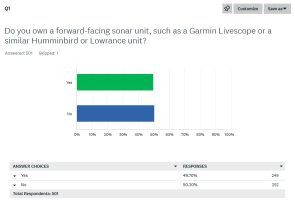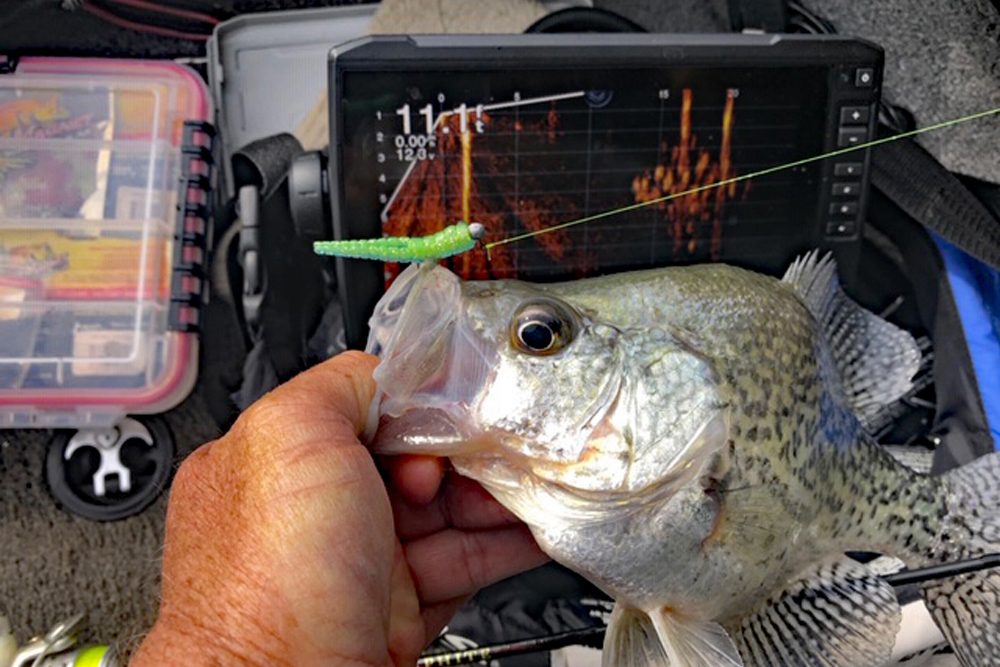More and more boats have a forward-facing sonar on the bow these days, but exactly how many? Numerous experts we asked couldn’t answer that question, so CrappieNOW Editor Richard Simms set out to find some answers himself. (Photo: Richard Simms)
Opening Cast: Forward-Facing Sonar Survey
by Richard Simms
How many fishermen are using forward-facing sonar nowadays?
And the survey says…
As the Editor of www.CrappieNOW.com Magazine I have recently been plagued by that question – “How many anglers on the water these days have purchased and are using forward-facing sonar (FFS)?”
The question is important to me because many of our writers often include at least some discussion about the use of FFS (such as Garmin LiveScope or similar Humminbird or Lowrance models) in their CrappieNOW articles. I was gravely concerned that perhaps the subject is not relevant to many, maybe most, of our readers – and in fact, we might be discouraging those people from following CrappieNOW Magazine. I desperately wanted to know what the current market-penetration of FFS might be.
I set about trying to find an answer to the question and inquired to numerous influential and knowledgeable sources as to the overall FFS market penetration, including some heavy-hitter fishing equipment manufacturing representatives. It seems no one could answer the question with anything more than an educated guess. And even then, they declined to be quoted for the record.
Therefore, I decided to conduct my own survey.
My survey (using the well-known SurveyMonkey.com platform) was TOTALLY UNSCIENTIFIC. Please do not use the information I’m about to share as “fact.” It is not, and I will never represent it as such. But it is the best information I’ve been able to come up with so far.
And of course, FFS market penetration will definitely increase in the coming years. My goal was to simply create my own snapshot of where it stands now… at least among folks in my social media network.
Albeit totally unscientific, I was truly shocked by the results! More than 500 people took the survey and of that number, nearly HALF indicated they do own forward-facing sonar.

Before doing this survey, my guess might have been that 10-15 percent of ALL anglers are using FFS. Even if my survey has a wide margin of error, I now know that my guess would have been way too low.
Perhaps folks were more inclined to respond to the survey if they do have FFS? Or perhaps my social media network includes a higher ratio of more advanced anglers more inclined to take advantage of the newest technology? Regardless, even if the survey is way off, I know the percentage of FFS owners is significantly higher than I ever would have expected.
Not unexpectedly, however, those who said they don’t have it say it is because it is too expensive.

The second-highest number of respondents to that question said, “I simply don’t like that style of fishing.” For the record, I fall into that category. I once owned FFS and then sold it.
Of the people who “Commented” on the reasons they do not have FFS, a large percentage indicated they have concerns about the technology impacting the resource.
EXAMPLES OF RESPONSES (among individuals who said they do not own FFS):
- It is depleting a renewable resource at a rapid pace
- Should be outlawed
- They’re a crutch for lazy fishermen. I can’t imagine a duller way to fish.
- Not willing to lose knowledge it has taken me a lifetime to acquire.
- Unfair
- Will eventually lead to too many fish being removed from lakes. State agencies will need to reevaluate the number of fish that can be taken out
- Too much technology in the sport already.
- I think they are unfair for sport fishing.
- It’s not fishing, it’s spotlighting
- Taking the “fishing” out of fishing
- I think they negatively impact the fish harvest.
- The technology is dumbing down anglers. I’ve fished for a living for almost 50 years. I’ve watched a steady decline in anglers that truly understand all the elements and those that are successful almost solely through tech. We are losing our skill sets. I blame tech for that. I’ve seen the full arc of electronics and use modern electronics in my business. This just crosses an ethical line for me. To each his own though.
The third question asked if survey respondents will ever buy FFS. Out of those respondents, 54 percent said, “No,” while 28 percent said it depends on if prices come down and 18 percent said they do expect to buy FFS.

Again, there is no doubt that the market penetration of FFS will increase, and it will increase fast if/when prices go down. In spite of those who say they will never use it, I can envision a day many years down the road when it may become the only type of fish-finding technology sold. Finding basic down-imaging sonar may become as difficult as it is to find a flasher unit on a boat nowadays.
Even though there are lots of people crying “foul,” and believe FFS should be outlawed (especially in tournament circles), the cow is out of the barn. Going backward is as likely as putting toothpaste back in the tube.
I interviewed famed professional bass angler Mike Iaconelli recently.
Iaconelli said, “For me personally, I love the art of fishing when you don’t know. When I grew up you were casting into the unknown. You’re engaging with the lure. You’re hunting and pecking and grinding. And when I came up in fishing, I’m so glad it was that way, where technology didn’t overrule the art of fishing.”
However, he continued, “Now I’m competing in an era of these younger anglers that are so good and so efficient (with FFS). And I want to compete with them. That side of me has to accept the technology as a tool.”
FFS is here. Accept it. It doesn’t mean you have to use it. But it does mean we have to write about it. FFS must be a great part of the information we are sharing with our readers.
Don’t worry. We will never forget those of you who do not embrace the technology. The folks who still like, as Iaconelli put it, “the art of fishing.” And hopefully those who fall into that category won’t forsake us as we try to straddle the fence as best we can.
Richard Simms, Editor
“The outdoors is not a place, it’s a state of mind.”

Richard Simms, Editor
“The outdoors is not a place, it’s a state of mind.”
Capt. Richard Simms is the Editor of CrappieNOW magazine as well as owner of Scenic City Fishing Charters. Formerly he was a game warden for the Tennessee Wildlife Resources Agency before becoming a photographer and PR guy for TWRA. That lead to a 30-year career as a broadcast journalist and freelance outdoor writer. Follow Capt. Simms other writings on his “Richard’s Ramblings” Facebook page.


